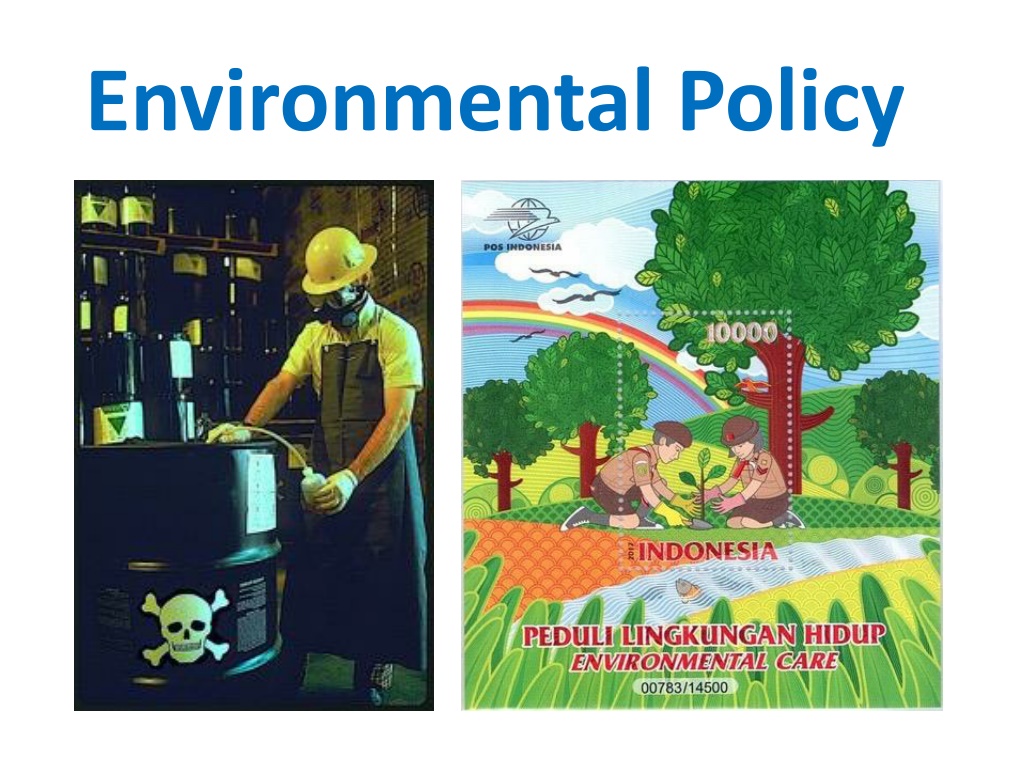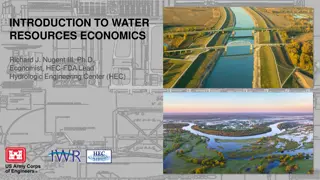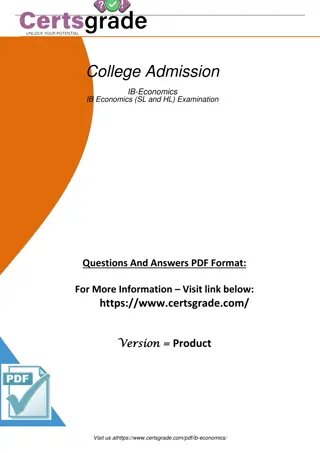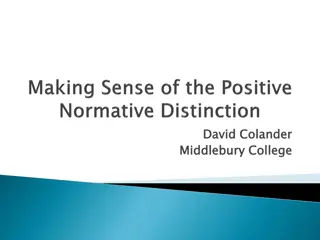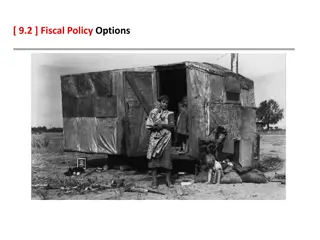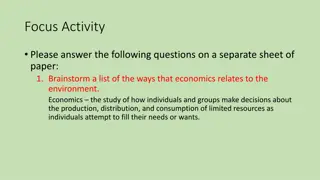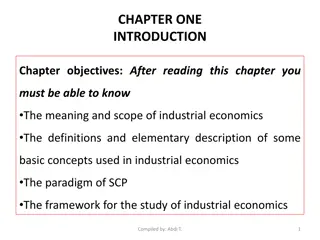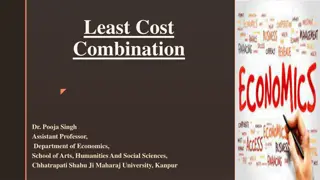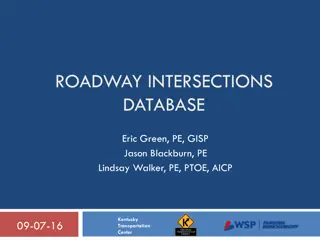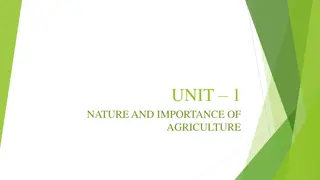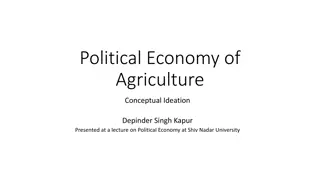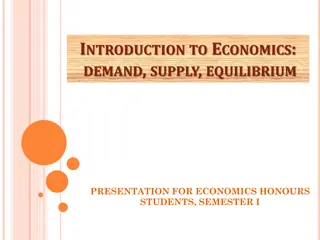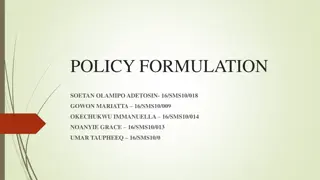Understanding the Intersection of Economics and Environmental Policy
Industry's role in our standard of living brings unintended consequences for the environment and human health. To formulate effective policies, we must consider the costs of damage, mitigation strategies, ethical impacts, and application of economic principles such as supply and demand. Balancing economic needs with environmental sustainability is crucial for long-term well-being.
Download Presentation

Please find below an Image/Link to download the presentation.
The content on the website is provided AS IS for your information and personal use only. It may not be sold, licensed, or shared on other websites without obtaining consent from the author. Download presentation by click this link. If you encounter any issues during the download, it is possible that the publisher has removed the file from their server.
E N D
Presentation Transcript
Industry plays a central role in our standard of living, but it also generates unintended consequences. How do we formulate cost-effective policies that minimize the damage to both the environment and human health?
Following the science is important, but science alone is not enough to address the social costs of environmental issues. Sound policy also requires a deep understanding of: Economics: What is the cost of the damage? What is the overall cost of the mitigation strategy? Ethics: Who is being disproportionately impacted? How do you ensure polluters pay the costs of mitigation? How do you address the tragedy of the commons ? How do you address greenwashing ?
How do we apply laws of economics to environmental issues?
Economics Lesson 1: The more consumers are willing to pay, the more suppliers will do to ensure availability of the product. https://brilliant.org/wiki/supply-and-demand/
Economics Lesson 2: As suppliers increase the price, less consumers are willing to purchase the product. https://brilliant.org/wiki/supply-and-demand/
Economics Lesson 3: How do these trends work together? Supply Demand
Economics Lesson 3: Supply surplus Demand If the price is too high, the supply will exceed the demand.
Economics Lesson 3: Supply Minimum wage causes unemployment when the hiring cost is set too high. surplus Demand If the price is too high, the supply will exceed the demand.
Economics Lesson 3: Supply shortage Demand If the price is too low, the supply will fall short of the demand.
Economics Lesson 3: Supply Price controls lead to product shortages when the price is set too low. shortage Demand If the price is too low, the supply will fall short of the demand.
Economics Lesson 3: Supply Demand The market price occurs at the intersection of the two lines.
Classical economics is also used to calculate internal costs like land, labor, & capital, but this approach by itself fails to account for externalities like pollution and resource depletion. Environmental economics builds on these basic principles in order to address the following questions: What are the costs of environmental degradation? What are the trade-offs between environmental protection and economic growth? Where do you draw the line to minimize costs to society?
Somewhat related: The LafferCurve indicates an ideal tax rate that is somewhere in the middle. *Why bother to produce if the government takes 100%!
Somewhat related: The LafferCurve indicates an ideal tax rate that is somewhere in the middle. A 100% tax rate decreases revenue because it impedes economic growth.* *Why bother to produce if the government takes 100%!
To clarify: The dotted line indicates an ideal rate that is somewhere between these two extremes. It does not prescribe a tax rate of 50%!
Not unlike the Laffer Curve, ideal pollution mitigation is found between two extremes of zero abatement and zero tolerance. How does zerotolerance for pollution incur a high cost to society?
Cost-benefit analysis of pollution abatement At this point, the cost of pollution exceeds the cost of abatement.
Cost-benefit analysis of pollution abatement At this point, the cost of pollution exceeds the cost of abatement. More needs to be done to curb the damage from the pollution.
Cost-benefit analysis of pollution abatement At this point, the cost of abatement exceeds the cost of pollution.
Cost-benefit analysis of pollution abatement At this point, the cost of abatement exceeds the cost of pollution. The measures for curbing the pollution are hurting the economy.
Cost-benefit analysis of pollution abatement This point is optimal because it results in the lowest cost to society.
Cost-benefit analysis of pollution abatement This point is optimal because it results in the lowest cost to society. This strikes a balance between environmental and economic costs.
What ethical issues are unique to the interaction between humans and the environment?
Tragedy of the Commons A commons is an area or resource shared by society as a whole. Examples include the atmosphere, aquifers, rivers, oceans, and public grazing lands. The lack of ownership and modern technology facilitate conditions for a zero sum game whereby exploitation of the resource exceeds its ability to recover. In his essay The Tragedy of the Commons ecologist Garrett Hardin calls for a fundamental extension of morality to address the stewardship of common pool resources.
Greenwashing Greenwashingis when a company uses deception to appear green engaging in business as usual. while This can be addressed in part through closer scrutiny and more rigorous standards for transparency. Images downloaded from: https:///best-programs-providers8billiontrees.com/carbon-offsets- credits-companies-2021/neutral-certification-companies/
The Kuznet Curve shows how the environment improves after wealth increases beyond a certain point. Unfortunately, some of this pollution gets outsourced to poorer nations! What are the ethical implications?
Main takeaway: Always do the necessary research to avoid the unintended consequences!
Main takeaway: Always do the necessary research to avoid the unintended consequences! Does the policy actually do good? Or does the policy just feel good? The results do not care about your feelings or your intentions!
